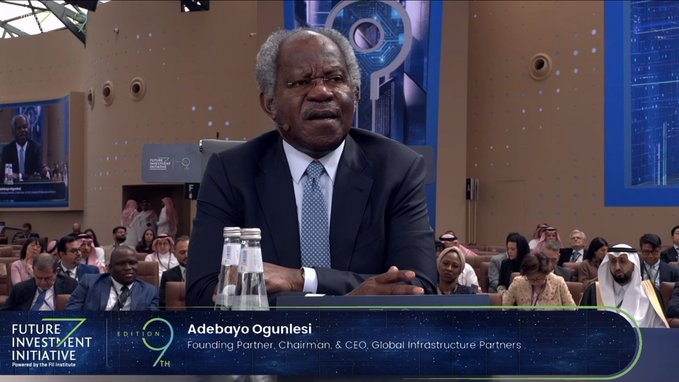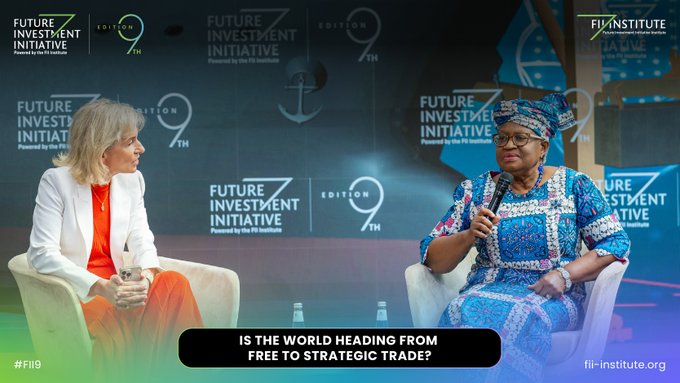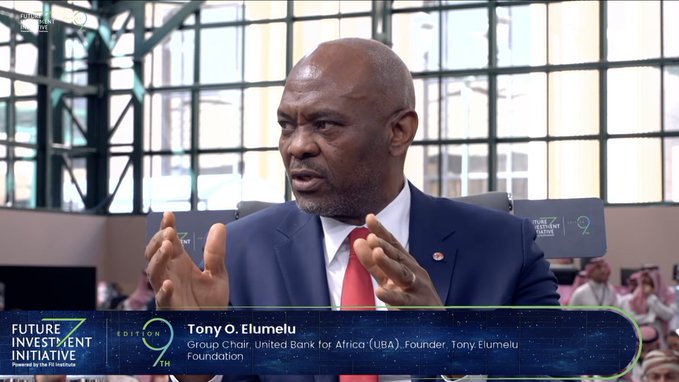The ninth edition of the Future Investment Initiative (FII) kicked off in Riyadh, Saudi Arabia, on Tuesday under the theme “The Key to Prosperity”. The event, often called “Davos in the Desert”, has grown into one of the world’s most influential gatherings for leaders, innovators, and investors shaping the global economy.
Nigeria’s leading economic and business figures are among the participants at this year’s forum, joining global leaders and investors to explore new strategies for sustainable growth and development. World Trade Organisation (WTO) Director-General Ngozi Okonjo-Iweala, Heirs Holdings Chairman Tony Elumelu, Global Infrastructure Partners Founder Adebayo Ogunlesi, and Transcorp Group Chief Executive Owen D. Omogiafo are among the key speakers at the four-day global investment summit, which runs from October 27 to 30 at the King Abdulaziz International Conference Centre in Riyadh.

But what exactly is the Future Investment Initiative, and why does it matter? Here are seven key facts that capture its journey, purpose, and growing global influence.
1. Established in 2017
The Public Investment Fund (PIF) was originally established in 1971 under Royal Decree No. M/24 to support the development of Saudi Arabia’s national economy. In its early years, the Fund played a key role in creating and
financing companies of strategic importance—many of which went on to become the Kingdom’s “national champions.”
In March 2015, the Council of Ministers issued Resolution No. 270, placing PIF under the supervision of the Council of Economic and Development Affairs (CEDA), chaired by Crown Prince Mohammed bin Salman bin Abdulaziz. This reform marked a turning point for the Fund, granting it greater autonomy and a clearer national mandate to drive economic transformation.
Building on this renewed direction, the Future Investment Initiative (FII) was launched in 2017 by PIF as a global platform to explore opportunities in finance, technology, and sustainable economic development. The first edition, held in Riyadh, established FII as an annual meeting point for global leaders, innovators, and investors shaping the future of the world economy.

2. Part of Saudi Vision 2030
FII is a key pillar of Saudi Vision 2030, Crown Prince Mohammed bin Salman’s long-term plan to diversify the Saudi economy away from oil dependence. The initiative supports national goals in sustainability, digital transformation, tourism, and private-sector development.
3. Hosted by the FII Institute
In 2019, the FII Institute was established as a global non-profit foundation with an investment arm. Its mission is to turn ideas into actionable solutions in four core areas: Artificial Intelligence, Robotics, Education, Healthcare, and Sustainability.
4. Attracts Global Participation
The conference regularly attracts world leaders, CEOs, investors, and innovators. Past attendees include Jamie Dimon (JPMorgan Chase), Laurence Fink (BlackRock), David Solomon (Goldman Sachs), and Christine Lagarde (European Central Bank), among others.

5. Platform for Global Deals
FII also acts as a dealmaking hub. The 2022 edition featured more than 28 investment deals and agreements worth more than $9 billion, ranging from renewable energy projects to technology partnerships and startup funding initiatives.
6. Focus on Emerging Sectors
Each edition focusses on key growth areas such as artificial intelligence, renewable energy, biotechnology, smart cities, and sustainable finance. The sessions will look at how investment can help to drive long-term, inclusive economic development.
7. Expanding Global Influence
FII is headquartered in Riyadh but has a global reach. It has held regional events in Miami, Paris, London, and Hong Kong, promoting Saudi Arabia as a link between East and West and a growing international investment hub.



